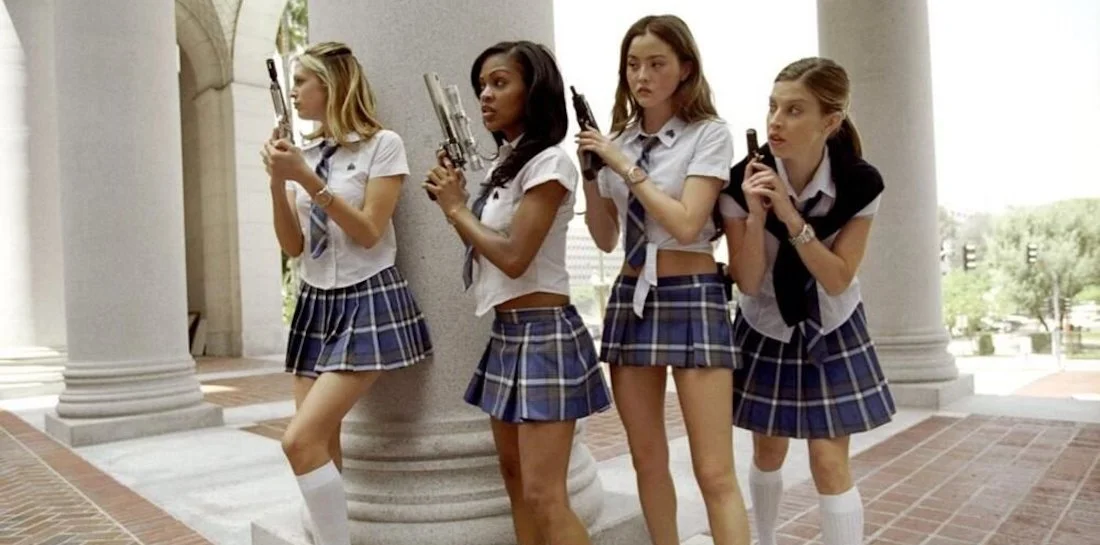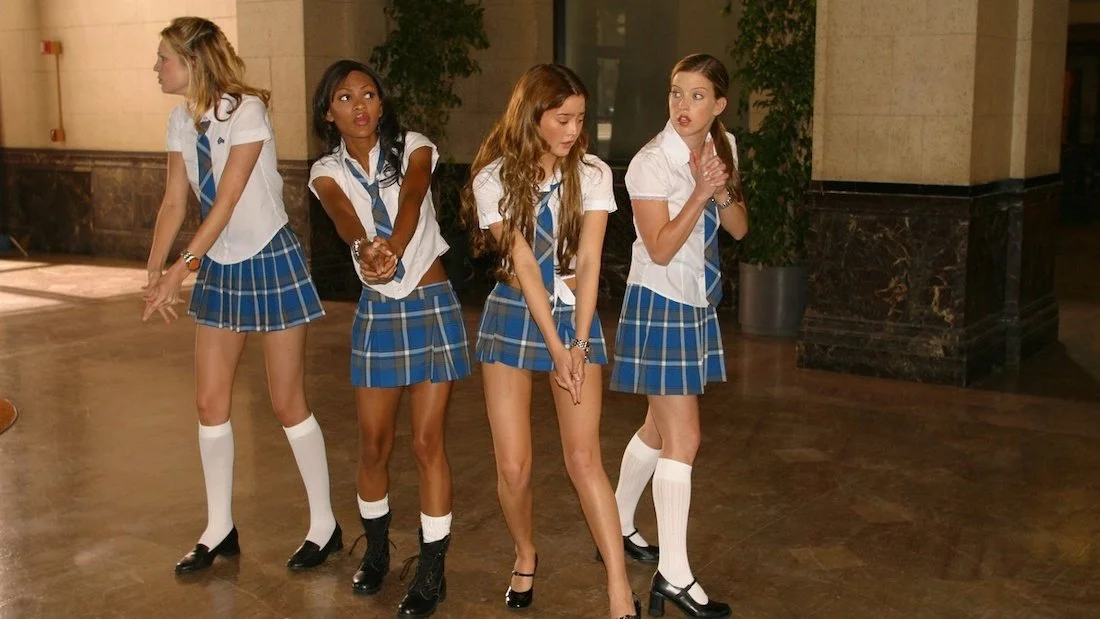D.E.B.S. (2004)
Queer and trans romance in popular media leaves much to be desired. Even with more representation in movies and shows streaming nowadays, what’s available can feel limited and weighted with reductive tropes. Which is why D.E.B.S.—one of the most underrated queer movies from the early 2000s—is so delightful to watch. Released in 2004, the movie plays with typecasts one might expect from an action feature and gives the audience comedic surprises instead. The cast includes many familiar actors from the era: Devon Aoki, Holland Taylor, Jimmi Simpson, Jordana Brewster, Meagan Good, and Michael Clarke Duncan, to name a few.
Written and directed by Angela Robinson, who wrote and directed episodes of the original The L Word, and the boundary-breaking movie PROFESSOR MARSTON AND THE WONDER WOMEN; she is known for creating work that centers and complicates queer narratives. Which is why viewers might feel a refreshing lack of the male gaze in D.E.B.S. The story has all the material to make it fit for fetishizing queer girl romance: schoolgirl outfits, girls kissing girls, and girls carrying automatic weapons like they weigh nothing. But instead, the action/comedy/romance invites viewers to revisit their assumptions and gives each character space to transcend those expectations.
D.E.B.S. follows a group of girls, or D.E.B.S. (Discipline, Energy, Beauty, Strength), who attend a top-secret, all girls, American spy academy. The academy recruits future spies through SAT scores that also assess espionage abilities. The top four D.E.B.S.—Max (Good), Amy (Sara Foster), Dominique (Aoki), and Janet (Jill Ritchie)—are given a special mission: surveil the notorious criminal, Lucy Diamond (Brewster). Heir to a world class crime syndicate, Diamond has been underground for years, and assumed to be continuing her life of crime. But the mythology that orbits her is disproportionate to the crimes she’s actually responsible for. Yet they are the reason for Amy’s obsession. Amy, the D.E.B. famous for her “perfect score,” is writing her senior thesis about Diamond; a kind of intellectual fixation that carries queer undertones.
A chance encounter between Diamond and Amy unfolds during a surveillance operation that turns into a shootout. Initially, they size each other up, guns drawn. Until Amy confesses she is writing her senior thesis on Lucy, and reveals her curiosities and doubts about the secondhand accounts she has read about the woman standing before her. Amy is conflicted, finally facing the woman she has been obsessing and studying for years; should she attempt to arrest her criminal obsession? Or let Lucy go? In a moment of indecision, Lucy escapes, leaving a pile of sparkling jewels in her wake. How or why these diamonds appear is never explained, but they reappear throughout the movie, and seem to make the extent of her villainous persona that much more absurd. A pile of glittering (and expensive) evidence that Lucy Diamond, the notorious myth, had once again evaded the spies.
After the encounter with Diamond, Amy becomes a hero; the one person who encountered Lucy and lived to tell the tale. But like anyone who meets a crush by chance, the unexpected chemistry between the two lingers and affects them both. Lucy has finally met someone she is attracted to, and Amy’s obsession is more obvious and complicated than ever. Through some questionably coercive choices on Lucy’s part, the two meet again, when Lucy appears in Amy’s bedroom and demands a date. Thus begins their entangled connection, one that will push each of them to challenge themselves and transform into the people they must become if they want to fully experience the love and understanding they feel with one another.
Watching D.E.B.S. for exciting fight scenes will likely lead to disappointment; the action is playfully unserious. But that’s what makes it such a great movie. It doesn’t take itself seriously in the ways you might expect from an action film. The most poignant message has little to do with espionage or spy gadgets, and everything to do with the difficulty of accepting love.
Love requires transformation from both parties. Cultural fears of intimacy and authenticity lead us to behave in ways that make it impossible for people to really see us, and therefore love us for who we really are. Even Dominique, who holds everyone at an indifferent distance, goes on to remind her teammates that you can’t always help who you love; a double meaning when considering Lucy’s position as both a criminal and woman. This culminates in Amy’s final speech where she is meant to accept a D.E.B.S. Of The Year award, only to rescind her acceptance and admit that in the end, for the sake of being honest with herself and the girl she loves, she must admit that the portrayal of Lucy Diamond that she was pressured to uphold, was in fact a myth, and that the real fraud is herself.
Replete with archetypes and faux accents, D.E.B.S. toys with all the typical tropes found in action movies, which is what makes the comedy both funny and fun. Dominique’s “seductive” French persona is almost cartoonish, complete with a never-ending supply of lit cigarettes, a constant pout, and half-naked boys tumbling out of her bed. Janet is the “clueless blonde” who continues to crash and foil Amy’s covert plans. She is more upset about Amy’s secretiveness than she is about Amy’s queerness and is quick to call her a “slut” or “whore.” But ultimately, she remains loyal to Amy and, inspired by her friend's courage, begins to explore a love connection of her own.
What’s interesting in the world of the D.E.B.S. is that Amy's affair with a girl isn’t what is shocking—it’s that her new lover is a criminal “wanted” by the very agency she works for. This is apparent in Janet’s slut shaming and Max’s feelings of betrayal; a decision Max views as abandonment. The emphasis is placed on Amy’s decision to cozy up to the enemy and leave her team in the dark, rather than her new lover’s gender.
There are many reasons D.E.B.S. was unsuccessful following its initial release. But the most obvious is that audiences were not ready to see or truly accept love between girls that wasn’t fetishized or vilified. Similar to the cult classic released five years earlier, BUT I’M A CHEERLEADER (which was pushed out of the public eye after receiving an NC-17 rating), there wasn’t space in popular imagination for a movie like D.E.B.S. A film where girls worked together to run the show and fall in love. Though it is still a product of the era, which is most evident in Janet’s slut shaming, the matching velour tracksuits, and the occasional use of the “r” word. It is also apparent in Max’s character. While she is the fearless leader and team commander who never backs down from a fight and is fiercely loyal to her squad (almost to a fault), her character can start to feel like a “Black best friend/sidekick” trope seen throughout Hollywood; a gross archetype that allows writers to get away with making Black characters two dimensional compared to their white peers.
The most beautiful (and queer) scenes in the movie are the montage of Amy and Lucy falling in love. While The D.E.B.S. are in shambles, working to rescue Amy from what they believe is a hostage situation, Amy and Lucy are skipping around town and playfully falling in love. We see them dancing together while listening to music, giggling in feigned horror after Amy accidentally launches a rocket from Lucy’s car, and sharing a milkshake. The montage concludes with a shot of the lovers watching the sunset at a view spot, Lucy sits on the hood of her car, holding Amy while they gaze longingly at the sunset.
The love they share changes them both. Not because of the “novelty” of a queer relationship, but the fact that, together, they have space to be more than their public reputations. With Amy, Lucy isn’t just a supercriminal, she is complex and joyful; and with Lucy, Amy doesn’t have to keep up the pressure of being top of her class, she lets loose and actually has fun. They give themselves, and each other, permission to do what true romantic intimacy asks of us: vulnerability in the face of uncertainty and possible rejection. Letting go of self-protection in exchange for the great possibility of love.
From an all-star cast to punchy one-liners, D.E.B.S. is one of the most underrated queer movies from the early 2000s and may have just been too ahead of its time. A romance story, disguised as an action “chick flick” comedy, D.E.B.S. is a must watch for anyone who is looking for a movie that will leave them excited to cheer for love.







